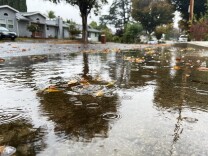
Next Up:
0:00
0:00
-
Listen Listen
Climate & Environment
The report concludes that the water supply was too slow, not too low, and even a functioning reservoir likely wouldn’t have stopped the Palisades Fire.
Listen
0:42
Sponsored message
More Stories
-
Fossil fuels are still a large source of electricity, but California has made progress with renewables while keeping the lights on.
-
The next blue supermoon will not happen until 2032, but supermoons occur more frequently.
-
Expect warming today and tomorrow, but another cooling trend by midweek.
-
Just like an impromptu hangout can as fun as a formal gala, even an informal green space can provide the benefits you'd get from an official park.
-
The summer games can't compete with rising temperatures. Here's what that means for the future of the Olympics.
-
Climate change is a major driver. But the economic principle of “winner’s curse” can lead to higher prices and less participation in insurance markets due to a lack of information on wildfire risks, University of California researchers say.
-
How one milkweed plant turned into a yearlong investment and fostered an unexpected community.
-
The method of using dogs' superior sense of scent toward conservation projects has been gaining ground in the United States.
-
There is a moment of awe that washes over you when you step into a forest. Century-old trees tower above, sunlight twinkling through them. Birds tweet. Spiders weave their elaborate webs. The smell of pine needles fill the air.
-
The Imperial Irrigation District will receive hundreds of millions in federal funds to further cut water use.
-
The last-minute Senate plan would delay by four years a law’s deadline for safety rules at oil wells near homes and schools.
-
A bill that would make California the first state to ban commercial octopus farming is still alive in the Legislature.
Philanthropic funds helped purchase a burned lot that used to have 14 rental units. Supporters hope the project can be a model for rebuilding equitably for renters.
Listen
0:42
Support your source for local news!
In case you missed it
-
911 recordings obtained by LAist shed light on why and how emergency planning continues to leave people with disabilities behind.
-
LAist investigates illicit dumping at three Antelope Valley sites.
-
An LAist investigation found toxic heavy metals in samples of fire retardant collected from the Palisades, Eaton and Franklin fires. Here's what that means.
More Stories
-
Two portions of the forest will remain closed for safety concerns and so the landscape can recover after the recent wildfires.
-
Customers are picking up the $1.7 billion tab after the utility’s equipment was linked to the wildfire and resulting flooding seven years ago.
-
Social and environmental groups claimed the project could cause water and air problems not disclosed in an environmental impact report.
-
L.A. had planned to take substantially less from the iconic Eastern Sierra lake this winter. The decision is a blow to conservationists who have been trying to restore the lake for decades.
-
Forecasted rainfall rates don't look like they'll be high enough to trigger debris flows in recently burned areas.
-
Researchers contributing to the ASCENT network of air quality sensors observed spikes in lead and chlorine downwind from the Eaton Fire — and their measurements are now publicly available.
-
Phase 2 of the clean up, which is optional, has started, ushering in a new chapter in what is sure to be a long road to recovery.
-
Extreme conditions helped drive the fast-moving fires that destroyed thousands of homes in the Pacific Palisades and Altadena.
-
An Assembly bill by John Harabedian aims to speed up housing recovery after the L.A. fires through a state-led task force.
-
Big Bear’s internet-famous bald eagle couple are getting another shot at parenthood.




































